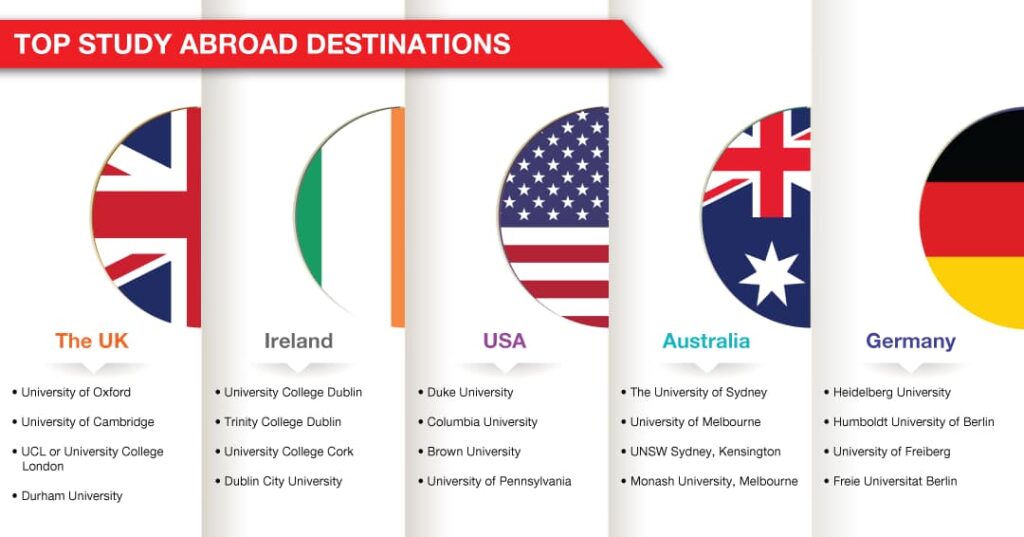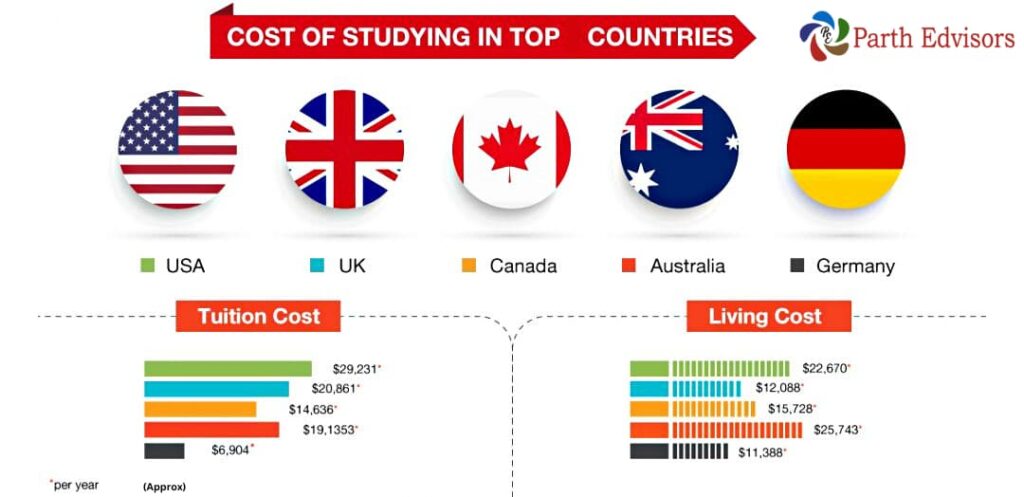One of the most important questions that pop into every student’s mind as they complete their bachelor’s is ‘How to pick a country for my higher studies?’ Choosing the country you want to spend pursuing your university education requires immense research and assessment of goals. We are here to help you answer the second most crucial task right after you choose a degree: How do I choose a country to study in and live in?
Begin with the basics and start with which country has your desired course. The second step after this is estimating your budget, the kind of scholarships you might be eligible for, and finding the admission requirements.
Check out the comprehensive list below to make a sound decision and decide your path.
A. Where do your interests lie ?
A. Where do your interests lie ?
- The first and foremost thing you need to do is assess your interests and likes. If there is a subject you’ve always wanted to study, go for it. And for those who are still deliberating: explore options. You must identify the degree attractive to you and where your skillset will flourish. Once you decide on your degree picking a country will be much easier. You will be presented with a shorter list to choose from as every course has its top universities.
- Even if you decide to look past the top university lists, you’re a simple search away from your desired course. Now that you have picked your path, looking for a university based on your financial, academic and cultural factors is only a few steps away.
- Consider the scope of your course, especially if you want to pursue further education.

B. How to pick the best universities?
B. How to pick the best universities?
- Use specialised educational websites for some research. There are countless portals, both Indian and International which cater specifically to programs. Information on Bachelor’s, Master’s or PhD courses is all available online.
- Of course, contacting counsellors is the best way to corroborate your research. (Parth Edvisors is a leading study abroad consultancy that provides you optimal support at each step. Reach out to us at parthedvisors or at 8178637360)
- Look at the university rankings, certifications and education standards in the country and internationally as well. There are official rankings available based on the area as well as global.
- If you’re going to a non-native English-speaker country, knowing the basics of the local language will prove helpful. You can broaden your country’s prospects if you speak a foreign language. It will help you connect well with locals even if the medium of instruction is English in universities.

C. Funding and Finances:
C. Funding and Finances:
- The first step is to look for universities that fit your education requirements and economic funding. The cost of tuition and living can be a deal-breaker for many international students, so that should be one of the primary factors in deciding the country.
- If one cannot fully afford international education, student loans and numerous scholarships or grants can aid in achieving your dream. (For expert guidance contact us at parthedvisors.com or call us at 8178637360)
- Sitting down and discussing your budgets and gunning for scholarships will help you tremendously as an international student.
- As it is suggested for all overseas applicants: the earlier you start, the better! A lot of time and commitment goes into studying well and creating a good profile. Promptitude without quality work will yield no benefits, however. Do not finish applications in haste, especially for your choice of universities.
- There are grants, scholarships and financial aid programs specifically for International and Indian students, something you should utilise. They are limited: university and country-specific.
- You can find opportunities available based on your background, economic profile, and chosen subject of study.
- It is essential to consider all costs, including tuition, living and food costs, cost of transportation, conveyance, and the fee to take entrance exams (GRE, TOEFL, GMAT, IELTS, and other English proficiency tests accepted by your choice of university). Ensure you consider the cost of tickets, application fees and some overhead charges apart from the leisure expenses.
- Keep up to date with the Scholarship announcements and government fund offers.
Do not hesitate to ask for your teachers’ or international student counsellors’ assistance. You will be grateful you went to the experts to help guide you. (For expert guidance contact us at parthedvisors.com or call us at 8178637360)
D. Find out others' experiences:
D. Find out others' experiences:
- Estimate the basics of living and academics from the official websites, public forums and Alumni corners if your university has them.
- Utilise the social media pages of the institutes to get a sneak peek into their students’ activities and special events.
- Call and ask your selected place and other classmates to connect with present students. If you get the opportunity to speak to them, they’ll have the latest idea of campus life and university workings. Usually, university tours administer this kind of campus exploration and arrange one, if possible, to properly check out the campus and city.
- Get in touch with other international students attending the same institute if possible. This will help you adjust better to a new climate.

E. Environment:
- Pick a country and area with low crime rates and a secure environment. Health and safety should be considered when deciding the country and city. Look for emergency and 24/7 support facilities.
- Parents’ biggest concern is their child’s protection, so on-campus housing with security guidelines should be the top choice. Connect with other students who already live in the dorms and research the supplies offered.
- Research immensely about the kind of area you’ll be living in. Look up articles and real-life experiences of people.
- Consider factors like safety, commute and general perspective of individuals. For example, students in Germany mention how natives value punctuality.
- Countries welcome international students with open arms, but preliminary research about where you’ll be living is imperative, no matter where you go.
- In most cases, if senior (Master’s or PhD) students opt out of dormitories, they live with relatives or roommates. Scope out your living and commute situation foremost.
- Find out if you have a community and connect with people like you. Experiencing a new culture can still be overwhelming even when you have researched enough to know what to anticipate.

F. Official Processes:
F. Official Processes:
- If there is an agreement between your home country and your choice of country the visa process will be smoother compared to one with no connections. (For seamless visa processing reach out to us at parthedvisors.com or at 8178637360)
- Enlist the required documents and know the entire process to avoid any hiccups. Completing travel and visa arrangements well in advance will make the procedure less complicated, avoiding any last-minute problems.
- Study in detail the immigration policies of both countries and legal jargon.
G. Prospects:
- Searching about university education, ranks and education policies will help you evaluate how good of a fit it is. (Need expert guidance, call us at 8178637360)
- Consider your career design, and find out about things like internships and possibilities to advance your skills and resume.
- Ask the faculty about the help they provide in building your curriculum vitae, such as career centres (the American equivalent of placement cells in India). They’re here to help students who want to engage and improve their future!
- Another advantage of attending a good university is the career opportunities and recruiting fairs.
- Ensure the country you have chosen has your desired employment prospects.
- It depends on whether you want to settle in the country or move back after completing your education.
Needless to say, there are numerous small and big factors to consider while moving to a new country. It often depends from person to person, their goals and personalities. Know that you are not alone in this process, there are counsellors and other international students by your side. There are even specific cultural societies in countries with a higher concentration of Indians.
Hope the above list provides an overview of the points to consider while picking which country to study in and assures you of a smooth and seamless process in each area
The author is the Director at Parth Edvisors, a leading overseas education consultancy specialising in applications to top-ranked universities across the globe.



